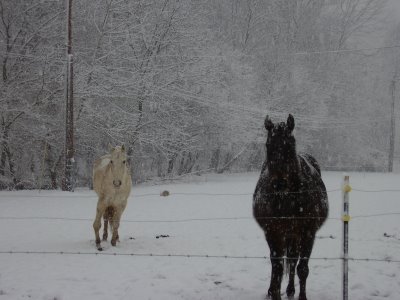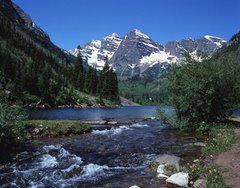Sunday, November 11, 2012
Monday, November 05, 2012
When Fear Grips the Human Soul
even the most godly of us have the capacity act in such a manner not characteristic of one who is trusting in God. What sort of things can create or accentuate fear? There is physical or emotional exhaustion. Concerns about the unknown — the I have never been this way before syndrome can create intense fear. Then there is sensing that life is beyond our control. Such situations have the potential of creating a lack of confidence in God. Disappointment sets in — we are not such “spiritual giants after all.” There is the sense that spiritual warriors such as Abraham or Elijah would never have failed in such a way.
But hold on a moment lets examine the lives of Abraham and Elijah. Did they never fail because of fear? The patriarch Abraham had a unique relationship with God. The Lord specifically called him to go to a foreign land where he would become a great people (Gen. 12:1-3). On numerous occasions God spoke to him (Gen 12:7, 15:1, 17:1-2). Prior to the Lord’s destruction of Sodom, the city in which his nephew Lot lived, Abraham spoke face to face with the pre-incarnate Christ negotiating to save the city from destruction (see Gen. 18).
In spite of this singular relationship with the Lord on two occasions he passed his wife off as his sister. He did this with Pharaoh (Gen. 12:14-15) and later on with King Abimelech of Gerar (Gen 20:1-2). He did this out of fear. Sarah was so beautiful that he felt his life would be in danger if he admitted to being her husband. In passing himself off as her brother he felt they would treat him well (Gen 12:12-13). Abraham followed this course of action even though God had yet to fulfill his promise of a son. He believed Jehovah’s promise of a son but lacked the confidence to trust God for the protection of his own life.
Then what about Elijah. He was a bold prophet of God who confronted King Ahab to declare that Israel would have a long drought (1 Kings 17:1). He faithfully followed God’s instructions during the time of the drought. Then he courageously confronted Ahab to declare the end of the drought 3 years later (1 Kings 18:17). His boldness continued to increase as he commanded Ahab to assemble the 450 prophets of Baal and the 400 prophets of Asherah for a competition which would determine whether Baal or Jehovah was truly God.
The prophets of Baal and Asherah lost the competition and Elijah slew all the prophets of Baal (1 Kings 18:40). In response to Elijah’s prayers God sent the rain (1 Kings 18:45). Then something happened. Queen Jezebel heard what Elijah had done and “sent this message to Elijah: “May the gods strike me and even kill me if by this time tomorrow I have not killed you just as you killed them”” (1 Kings 19:2). The queen's message so terrified this mighty prophet of God that he fled to Beersheba and then into the wilderness. He was able to stand up to the king, to questions about his credibility as a prophet of the Lord (1 Kings 17:24) and to 850 false prophets but then fear gripped him in the angry and threatening words of Quen Jezzebel. All of a sudden he lacked the confidence to trust God for his continuing protection.
What happened to these two men? Under situations of intense physical and psychological stress both became frozen with fear and temporairly lost the ability to trust in the Lord. Fear had placed them successfully in the chains of bondage. Have you ever been in a stressful situation where you felt stretched beyond all human endurance? How did you react to that situation? --- was it one of great confidence in God --- or did you also experience the deep freeze of fear as Abraham and Elijah did in their extreme hour of testing. May God grant us the strength to stand firm!
Copyright. Bruce November 2012
Note: All quotes taken from the New Living Translation Second Edition.
Posted by
Bruce
at
11/05/2012 09:22:00 pm
![]()
Labels: Articles
Thursday, October 25, 2012
In Hardwood Groves
 Before the leaves can mount again
Before the leaves can mount againTo fill the trees with another shade,
They must go down past things coming up.
They must go down into the dark decayed
Robert Frost --- In Hardwood Groves
Posted by
Bruce
at
10/25/2012 06:26:00 pm
![]()
Friday, October 19, 2012
It Is Amazing How Often We Seek
to get the upper hand in situations. Scripture illustrates that there are dangers associated with such a desire.
Abram and Lot had left Egypt and were traveling towards Bethel (Gen 13:3). Both had significant herds and flocks. Living in such proximity friction developed between the households (Gen 13:8). To create harmony Abram proposed dividing up the land. He allowed his nephew to have the first choice. Lot picked, what appeared to be best, the fertile land of the Jordan Valley. Unfortunately, this meant that his neighbour was the wicked city of Sodom.
In time Lot moved into Sodom (Gen 14:12). When the city was attacked Lot, his family and possessions were carried off by the enemy. They were rescued by Abram (Gen 14:16). In time God decided to destroy the city while protecting Lot’s family. Fleeing the city Lot’s wife looked back and became a pillar of salt (Gen 19:26). He fled to Zoar but fearing the people he moved to a mountain cave.
When it seemed things could not get any worse Lot’s two daughters conspired to commit incest with him. The result was that both became pregnant (Gen 19:36). The children would become two distinct nations, Moab and the Ammonites, both of whom were usually antagonistic toward Israel.
Then there was crafty Jacob. His parents had favorites. Isaac loved Esau best while Rebekah’s favorite was Jacob. When it was time for Isaac to bless the eldest son Rebekah devised a plan whereby Jacob would steal the blessing (Gen 27:5-10). The plan succeeded but the repercussions where massive. Isaac “began to tremble uncontrollably” (Gen 27:33) and Esau planned to murder Jacob (Gen 27:41).
Rebekah encouraged Jacob to flee to her brother Laban (Gen 27:43-45) promising to send for him when things were safe. Mother and son never saw each other again. He spent 20 years of conniving against Laban during which time he married his two daughters. Jacob grew wealthy at his uncle’s expense. Laban’s sons angrily claimed Jacob “has gained all his wealth at our father’s expense.” (Gen 31:1) Their inheritance now belonged to Jacob. Things were getting uncomfortable in Haran
Finally, God instructed Jacob to return home (Gen 31:3). However, he is still living in fear of Esau. Nearing home hearing that Esau is coming to meet him with 400 men Jacob responds by crying out: “O Lord, please rescue me from the hand of my brother, Esau.” (Gen 32:11). The meeting of the brothers is cordial though artificial. Esau invites Jacob to live near him. Not trusting Esau he moved off in the opposite direction. The only other mention of the brothers being together is for the burial of their father Isaac (Gen 35:29).
Here we have two men seeking to have the “upper hand”. Lot’s life became a slippery slop that took him from a wealthy owner of herds to a destitute, frightened man living in a cave and fearing for his life. Jacob was driven from home by the threats of an angry brother. His relationship with Esau apparently never healed. While living with his mothers family he became wealthy again at the expense of family relationships. Jacob’s life had become full of fear, anxiety and suspicion because of one up-man-ship.
Trying to get ahead in life at the expense of others always brings negative consequences even if there is ultimately significant material gain. God’s desire for us is that we treat others the way we wish to be treated (Mat 7:12). When this attitude becomes a personal reality the desire to “one up” others will disappear.
Copyright. Bruce October 2012
Posted by
Bruce
at
10/19/2012 08:24:00 pm
![]()
Labels: Articles
Wednesday, December 29, 2010
Stopping By Woods On A Snowy Evening
 Whose woods these are I think I know.
Whose woods these are I think I know.His house is in the village though;
He will not see me stopping here
To watch his woods fill up with snow.
My little horse must think it queer
To stop without a farmhouse near
Posted by
Bruce
at
12/29/2010 04:15:00 pm
![]()
Thursday, December 23, 2010
Have You ever Wondered Who the Magi Were
Posted by
Bruce
at
12/23/2010 04:17:00 pm
![]()
Friday, November 19, 2010
Going For Water
And in the hush we joined to make
We heard, we knew we heard the brook.
Robert Frost --- Going For Water
Posted by
Bruce
at
11/19/2010 07:08:00 pm
![]()


